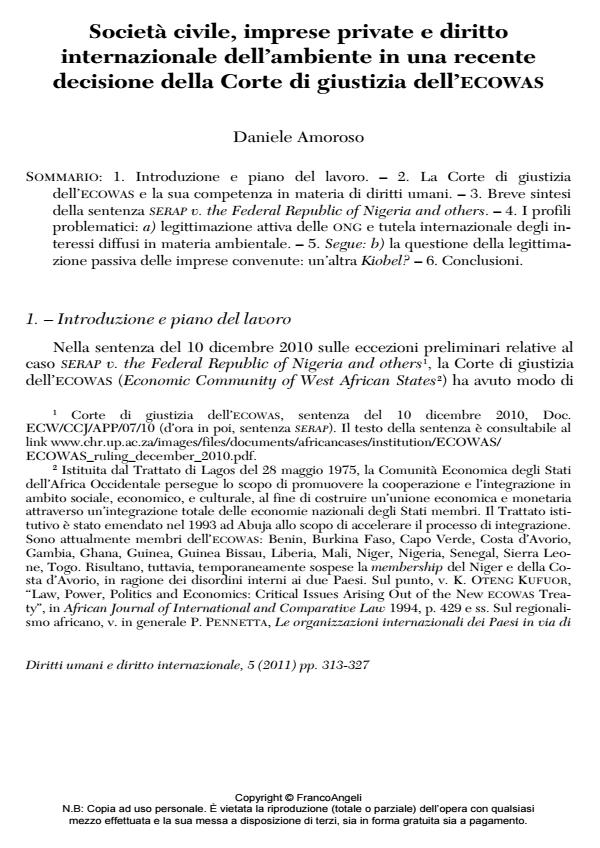Società civile, imprese private e diritto internazionale dell’ambiente in una recente decisione della Corte di giustizia dell’ECOWAS
Titolo Rivista DIRITTI UMANI E DIRITTO INTERNAZIONALE
Autori/Curatori Daniele Amoroso
Anno di pubblicazione 2011 Fascicolo 2011/2
Lingua Italiano Numero pagine 15 P. 313-327 Dimensione file 198 KB
DOI 10.3280/DUDI2011-002005
Il DOI è il codice a barre della proprietà intellettuale: per saperne di più
clicca qui
Qui sotto puoi vedere in anteprima la prima pagina di questo articolo.
Se questo articolo ti interessa, lo puoi acquistare (e scaricare in formato pdf) seguendo le facili indicazioni per acquistare il download credit. Acquista Download Credits per scaricare questo Articolo in formato PDF

FrancoAngeli è membro della Publishers International Linking Association, Inc (PILA)associazione indipendente e non profit per facilitare (attraverso i servizi tecnologici implementati da CrossRef.org) l’accesso degli studiosi ai contenuti digitali nelle pubblicazioni professionali e scientifiche
In the judgment on preliminary objections in the case of SERAP v. Nigeria and others, the ECOWAS Court of Justice was called upon to take sides on some controversial issues concerning the role played by NGOs and the private sector in the field of international environmental law. On the one hand, indeed, it had to assess whether a NGO has locus standi to claim before an international tribunal the infringement of the right (rectius the diffuse interest) to a healthy environment. On the other hand, the Court was asked whether it has jurisdiction over private companies accused of having violated international environmental law standards. The ECOWAS Court answered in the affirmative to the first question, while giving a negative reply to the second one. Both findings were reached on the basis of argumentations which are sure to stir debate among scholars. In the present note, the main question emerging from this judgment will be discussed in some depth.
- More Equal than Others? Lorenzo Acconciamessa, pp.237 (ISBN:978-94-6265-538-6)
Daniele Amoroso, Società civile, imprese private e diritto internazionale dell’ambiente in una recente decisione della Corte di giustizia dell’ECOWAS in "DIRITTI UMANI E DIRITTO INTERNAZIONALE" 2/2011, pp 313-327, DOI: 10.3280/DUDI2011-002005